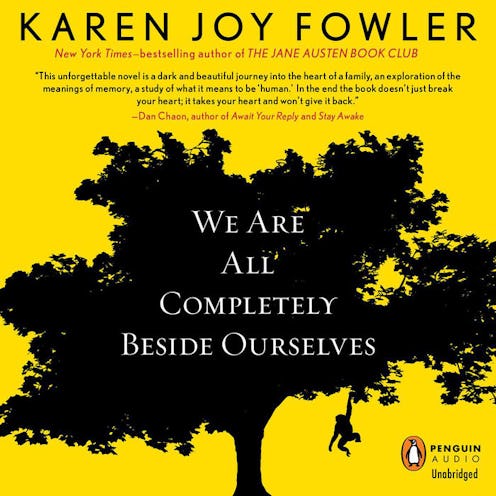Books
In Defense of Reading Blind

What I want you to do: Read this article, naturally. What you should do: Just turn away and blindly go read We Are Completely Beside Ourselves.
At a certain point in Karen Joy Fowler's We Are All Completely Beside Ourselves (Putnam), I decided I suck as a reader. Damn my lack of attention to details! How did I miss this narrative twist? How did I not foresee this dramatic revelation? Fowler's novel takes such a radical turn that I felt I could only blame myself for not having predicted it.
As it turns out, though, my reaction is a testament to Fowler's gift as an author, not my lack of skill as a reader. I am one of the lucky ones who went into the novel blind. I had read no criticism and fortunately finished the book before Barbara Kingsolver's spoiler-heavy New York Times review. My bewildered reaction to the revelation 80 pages into the book speaks to Fowler's ability as a devotedly careful renderer of plot.
Here come the spoilers that you really should avoid if you want to benefit from reading blindly: This is the story of the Cookes, a family that commits itself to participation in a psychological behavioral study. Rosemary, the witty narrator, grows up alongside a female chimpanzee, Fern. The two are raised as sisters, twin parts of a whole. Every aspect of their development and relationship is studied and analyzed by a team of graduate students. One day, Fern is sent away, and the family is sent reeling. Rosemary is deeply damaged and confused, her older brother embarks on a passionate crusade for justice for animals, and her parents are immensely depressed and uncommunicative.
Fowler conceals all of this in the first 80 pages of the book and starts from the middle of Rosemary's story. She is in college and in trouble. Her memories invade her present, and it's obvious her childhood has bruised her–though the ways in which aren't revealed until Fowler has totally chained us to Rosemary. Her sharp and impassioned voice guides us through this story of a family, which, like so many, is atoning what seems irreparable: Disasters in parenting decisions, lies, and loss. The ways they attempts to repair themselves when they are no longer under scientific scrutiny are loaded with suspense–and I will leave those details for you to semi-blindly discover.
I was fortunate to read blindly, but others will inevitably not fare so well. Though I've spoiled nothing yet, if you're reading this article, it's probably too late for you to have a totally uninformed experience of Fowler's masterpiece. When you know there will be a surprise waiting for you, you're already hyper-tuned to every sentence. No matter how graceful and genius Fowler is—and she is extremely—those who know to expect something will not be able to enjoy the moment of total bewilderment that I did.
In my utopia, no one would talk about—or even hint about—books before everyone had finished reading them. Today's rumination: Take the rec of the friend trying to blindly foist that novel upon you without looking up the review.